2025 – CHW
A look at some Hydrangea quercifolia varieties. These are fairly short lived but very good value in August.
A fairly newly planted Hydrangea quercifolia group on the drive. Only 1 of 3 has survived.
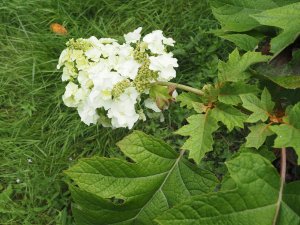
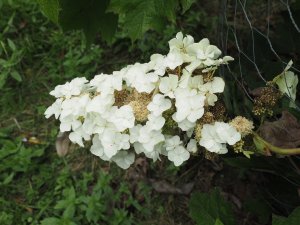
Hydrangea quercifolia ‘Snowflake’ with early autumn colouring in full sun.
Hydrangea quercifolia not flowering well and rather showing its age.
Hydrangea quercifolia ‘Burgundy’ looking well in rather too much shade. Few flowers and no sign of its wonderful autumn colour as yet.
Hydrangea quercifolia ‘Pee Wee’ not exactly covered with flowers below Slip Rail.
Hydrangea quercifolia ‘Snowflake’ above the greenhouse also well coloured up early.
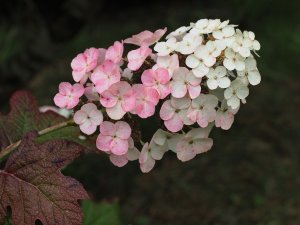
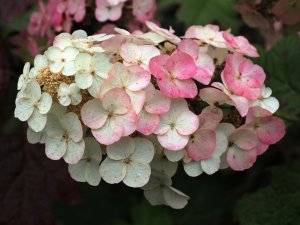
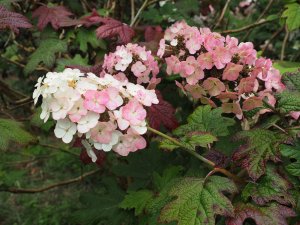
Cattle below the castle.
2024 – CHW
Eucryphia x hillieri ‘Penwith’ with its purple anthers.
Eucryphia x hillieri ‘Penwith’ with its purple anthers.
Hoheria ‘Glory of Amlwch’ full out.
Cotoneaster cornifolius (Ogisu 93330) laden with berries.
Cornus drummondii ‘Sunshiny Drops’ putting on a good show. How we were ever meant to get this into flower for the Chelsea Plant of the Year competition in late May I will never know.
A good Rhododendron ‘Polar Bear’ in the Ririei Opening.
Bright pink anthers on Eucryphia x nymansensis ‘Nymansay’.
Rhododendron prunifolium putting on a better show than usual on from George’s Hut.
The very last flower on Magnolia ‘Porcelain Dove’.
2023 – CHW
This wonderful Rhododendron parishia (CWJ 6346) – (as it is labelled) is clearly from Section ponticum subsection Parishia but what species exactly? Not really much like Rh. parishia which flowers in March/ April. More like Rh. kyawii which we saw in flower here a fortnight or so ago. It’s very fine and well worth growing whatever it is exactly. I have never seen the 3 plants perform as well as this.
This wonderful Rhododendron parishia (CWJ 6346) – (as it is labelled) is clearly from Section ponticum subsection Parishia but what species exactly? Not really much like Rh. parishia which flowers in March/ April. More like Rh. kyawii which we saw in flower here a fortnight or so ago. It’s very fine and well worth growing whatever it is exactly. I have never seen the 3 plants perform as well as this.
We now have several plants of Magnolia caveana making good headway but, I fear, years before we get to see a flower.
The late flowering large clump of Rhododendron decorum below Tin Garden. This and the pink form of Rh. decorum need propagating as a priority.
Seed heads forming on Rhododendron ‘Sir Charles Lemon’. I have not seen this often. As we saw in the spring this group flowered exceptionally well.
Still flowers on Magnolia sieboldii ‘Genesis’ x M. virginiana.
Flower heads appearing on Schefflera pauciflora (WWJ 1199). A rather different form of S. pauciflora.
Rhododendron pseudochrysanthum virtually dead after the 2 dry summers. The second plant beside it is completely dead.
A vigorous elm root sucker removed from the heather beds at the 4-in-Hand.
2022 – CHW
Drought stricken big leaf Rhododendrons in Higher Quarry Nursery. But help is at hand and Tim has the hosepipe on from the little used water tanks below the church.
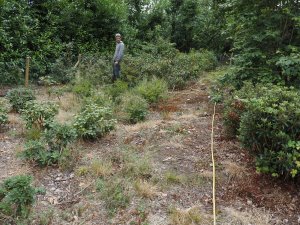
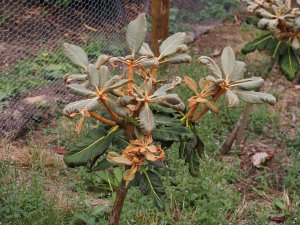
Plenty of elm-like pink seeds on Dipteronia sinensis.
Hoheria angustifolia is covered in flowers high up the now 30 foot tall tree.
The very last tiny flower on Maackia chinensis (now M. hupehensis). The rest are over with seeds forming.
Hoheria glabrata already with seed heads.
We were only saying the other day that we had lost our last Rhododendron rhabdotum. Thankfully we have not. I bought 3 from the Cox’s 4 or 5 years ago and this is the sole survivor. An unshapely grower like so many of the ‘smellies’.
The ancient Aesculus wilsonii is hating the drought which is speeding its final demise.
This young (grafted) Magnolia ‘Caerhays Belle’ tried to flower last November and the buds turned to black mush. Despite the few setting seeds I fear the buds are far too advanced already for the plant to again be getting its seasons wrong. I wonder why?
2021 – CHW
Lots more rain, several branches on young magnolias snapped off in the wind and yet more secondary new growth. The end of the drought risk for this season.Buddleia lindleyana nicely out.
Lots more rain, several branches on young magnolias snapped off in the wind and yet more secondary new growth. The end of the drought risk for this season.Buddleia lindleyana nicely out.
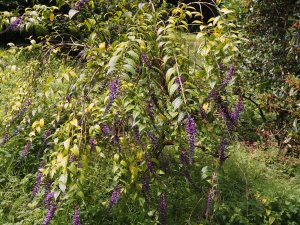
The fire which the tree surgeons had in the middle of a laurel hedge smouldered away for a week and then set alight the roots and then the trunk of a nearby Pinus insignis. A digger was needed to bring it under control. The remainder of the laurel hedge lost. Not happy!
Pterocarya rhoifolia with attractive new growth.
A group of three Betula insignis ssp. fangipanensis with bronze secondary new growth appearing now. One tree is fine, one so-so, and one now dead.
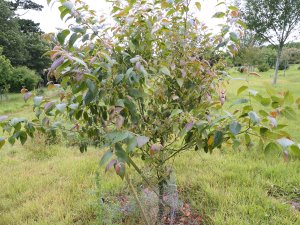
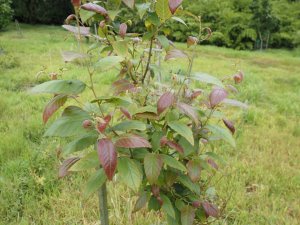
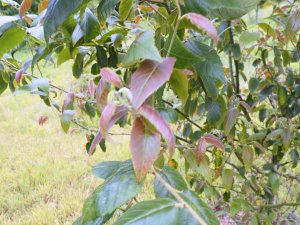
Sorbus gongashanica in berry already.
Very few fruits on Crataegus schraderiana this year unlike last.
Crataegus wattiana with fruits turning colour already.
Crataegus aprica still has green fruits and only a few.
Crataegus combyi with fruits colouring.
Crataegus ellwangeriana ‘Fire Ball’
A group of Hoheria sextylosa ‘Snow White’ which are now 8-10ft tall. Only one of them is flowering properly and, even there, the flowers are hidden in with the leaves.
2020 – CHW
Rubus phoenicolasius is ripe in parts and the young pheasants have not yet eaten the fruits as they will. An artist has asked to come and paint this ornamental bramble but they will be too late in September.
Rubus phoenicolasius is ripe in parts and the young pheasants have not yet eaten the fruits as they will. An artist has asked to come and paint this ornamental bramble but they will be too late in September.
Tail end flowers on Hydrangea involucrata ‘Viridescens’ above The Hovel.
Rubus lineatus only has a couple of fruit clusters this year but is making a decent shrub.
A top grafted Sorbus reducta with fruits forming.
Lots of seeds have set on an old Rhododendron schlippenbachii above the drive at Red Linney. Unusual to see so many. Asia needs to collect when ripe later on.
Hydrangea ‘Blue Wave’ (‘Mariesii Perfecta’) looking good on the drive. A better blue than some years and this clump are in full shade.
Alison’s hanging basket begonias at the top lodge as good as ever above her front door.
2019 – CHW
A collection of Clethra in flower today:Clethra tomentosa ‘Cottondale’ is a suckering species from the SE USA. It grows to around 6ft in height here with a similar spread.
A collection of Clethra in flower today:Clethra tomentosa ‘Cottondale’ is a suckering species from the SE USA. It grows to around 6ft in height here with a similar spread.
Clethra alnifolia ‘Pink Spires’ is single stemmed here with a rather floppy habit. Looks good beside C. tomentosa and is a good border shrub.
Clethra kaipoensis flowering for the first time here. An upright tall growing tree with reddish new growth stems and striated more mature bark. I need to look up where we got this from.
Clethra monostachya (a second plant to the one seen a few days ago) is nearly over but setting copious seeds on the former flower racemes.
Two plants of Clethra pringleyi. One is over with seed pods forming and is ready for Asia to collect. On the other the flowers are not yet out.
2018 – CHW
An occasional shower and a definite cooling of the temperature. Heavy rain for Saturday forecast. The worst of the drought for our garden plants may now be over?The Magnolia denudata ‘Forrests Pink’ which was felled by a large leylandii in the winter has reshot with great vigour. We saw this three months ago. It is in a damp spot so the drought has made no difference.
An occasional shower and a definite cooling of the temperature. Heavy rain for Saturday forecast. The worst of the drought for our garden plants may now be over?The Magnolia denudata ‘Forrests Pink’ which was felled by a large leylandii in the winter has reshot with great vigour. We saw this three months ago. It is in a damp spot so the drought has made no difference.
The best blue mophead hydrangea in the place; or so my father always said. It grows in shade. It is not quite the same as Hydrangea ‘Enziandom’ but quite close. Nearer to Hydrangea ‘Benelux’ perhaps?
So far the hedychium have not been eaten by roe deer as they were last year. The stems were reduced to pulp last September.
2017 – CHW
Overhanging our garden is Acacia dealbata loaded with ripe seeds. They hang down in tassels like sophora seeds.
Overhanging our garden is Acacia dealbata loaded with ripe seeds. They hang down in tassels like sophora seeds.
One of those big leaved hebes that grow badly in wet Cornwall is doing well here in Seaview. This is Hebe ‘Great Orme’ I think.
2016 – CHW
No entry.
2015 – CHW
Several people have commented on the extraordinary colour of a clump of mophead hydrangeas up from Red Linney on the bank. They are Hydrangea Selma, planted in 2009 and billed as being a very dark red. In our acid soil they are as dark a purple as I have ever seen in a hydrangea and quite superb in full sun.
No entry.
2015 – CHW
Several people have commented on the extraordinary colour of a clump of mophead hydrangeas up from Red Linney on the bank. They are Hydrangea Selma, planted in 2009 and billed as being a very dark red. In our acid soil they are as dark a purple as I have ever seen in a hydrangea and quite superb in full sun.
Above Four in Hand is a late flowering buddleia with small purple flower spikes; Buddleia lindleyana. A Chinese species which is strikingly beautiful and introduced in 1843 by Robert Fortune.
On the top wall are very old clumps of Fuchsia magellanica ‘Alba’. It flowers sparsely in shade and the white flowers have a faint mauve tinge. According to Hillier’s the correct name is now Fuchsia magallanica var molinae whereas the ‘true’ ‘Alba’ has a pink corolla! JCW collected fuchsia species in the 1930s and this, like Fuchsia gracilis and Fuchsia riccartonii, is one of the few survivors. It enjoys frequent pruning but would grow to six feet if left unchecked and has nice peeling bark in winter when the woody stems are mature. A few of the hardier fuchsia hybrids which I collected 40 plus years ago still survive in the bed along from the old gents’ urinal but I can no longer remember their names and most are hardy reds with blueish-purple corollas. Pretty dull by fuchsia standards today. Without a conservatory most of the species offered by Burncoose now are simply too tender. I wonder if JCW tried any fuchsia hybrids? Certainly P D Williams at Lanarth produced some erica hybrids which are still sold today and introduced the Spanish Erica canaliculata to Cornwall.




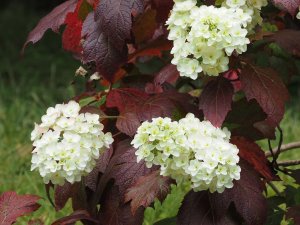
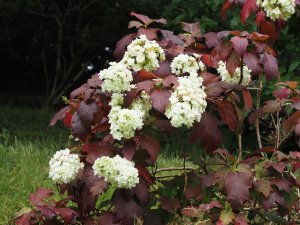
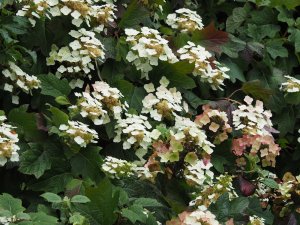
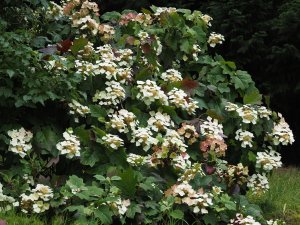
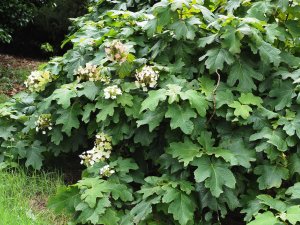
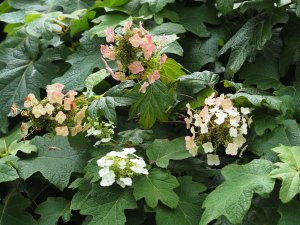
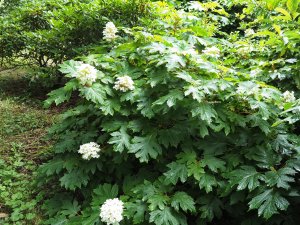
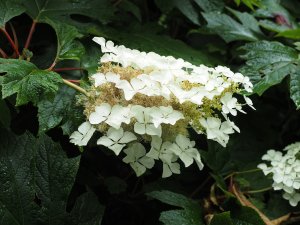
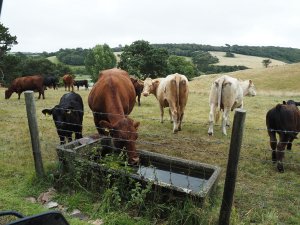
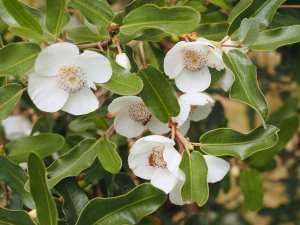
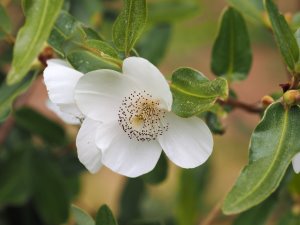
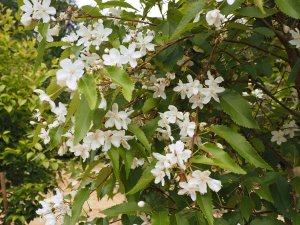
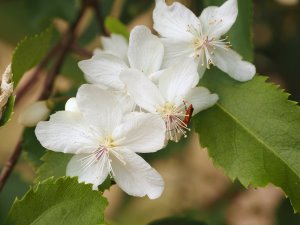
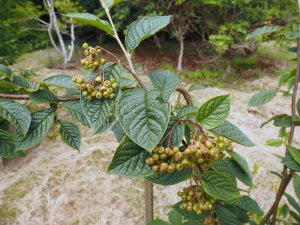
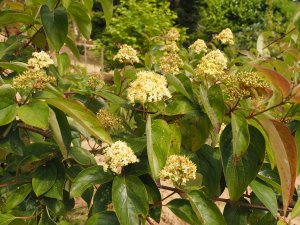
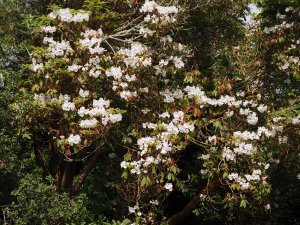
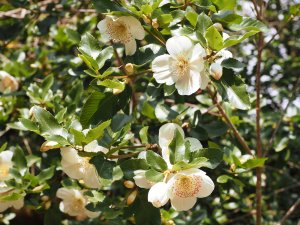
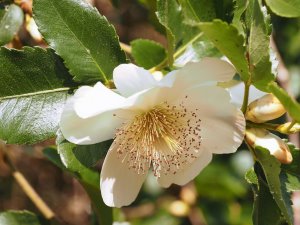
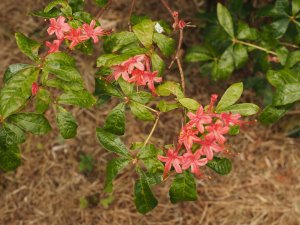
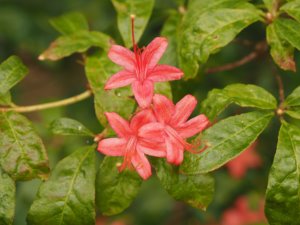
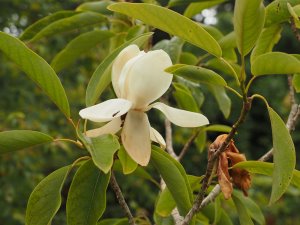
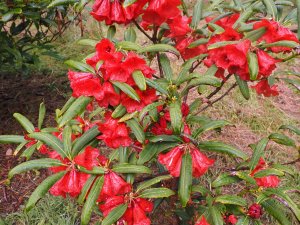
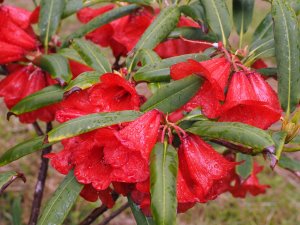
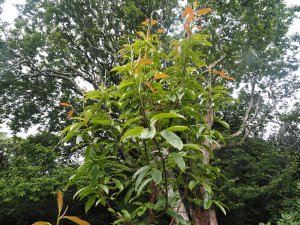
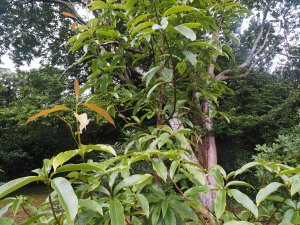
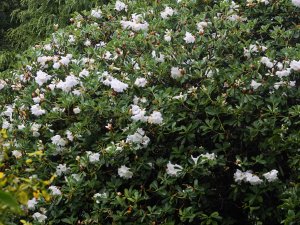
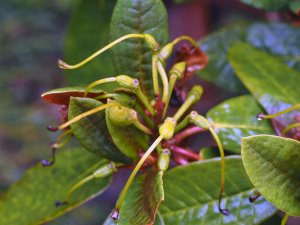
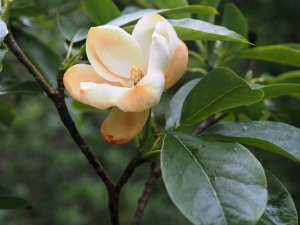
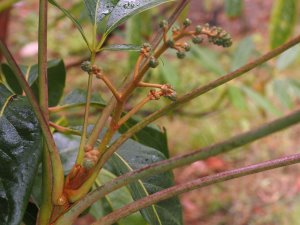
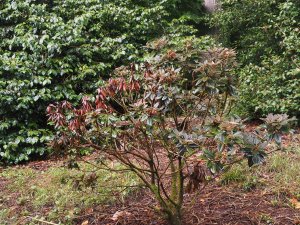
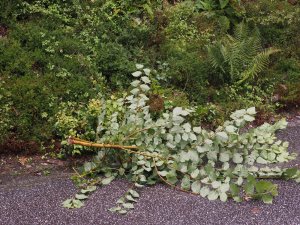
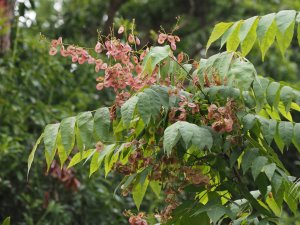
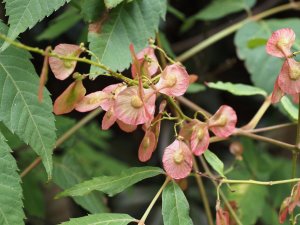
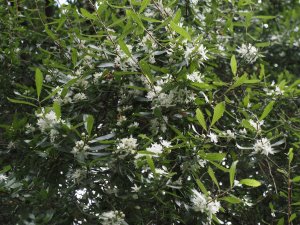
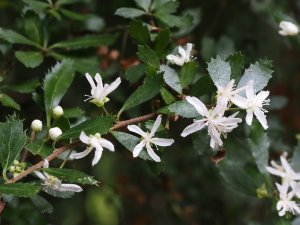
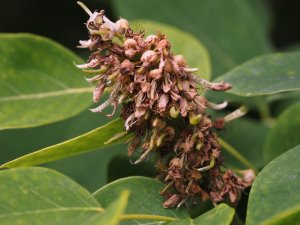
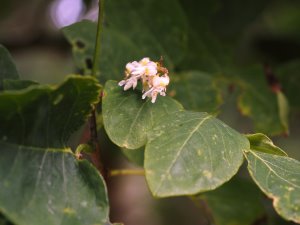
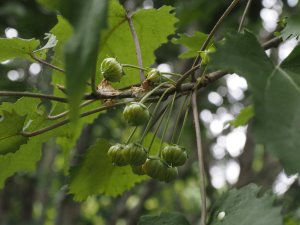
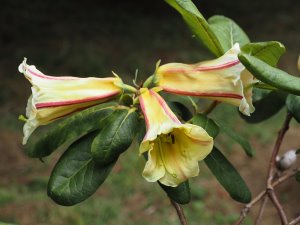
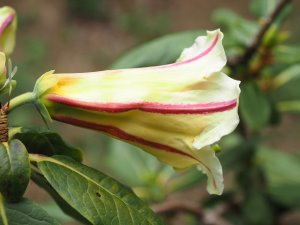
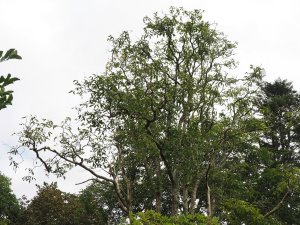
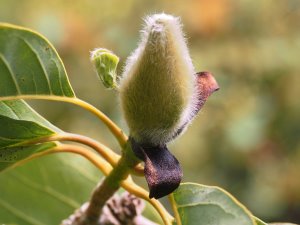
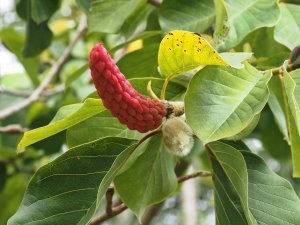
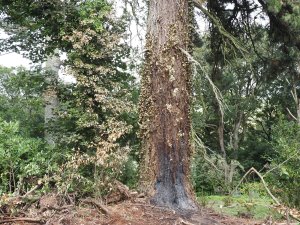
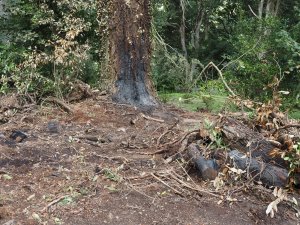
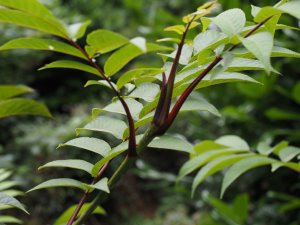
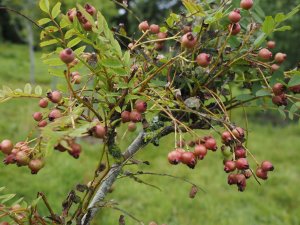
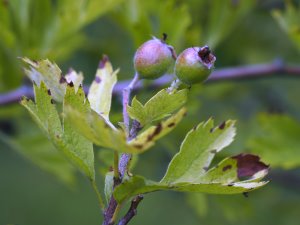
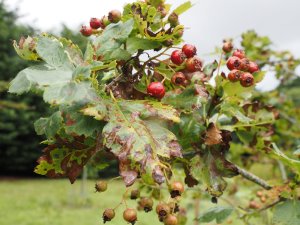
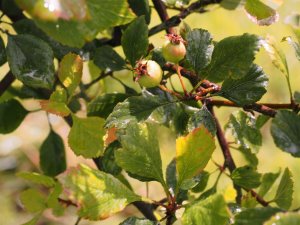
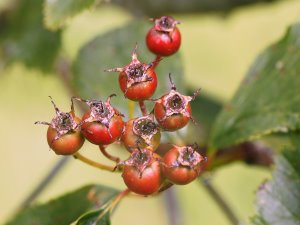
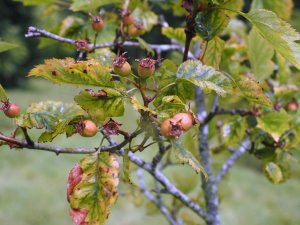
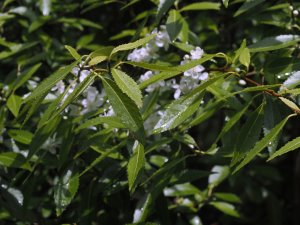
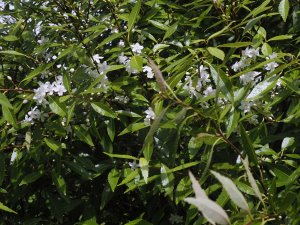
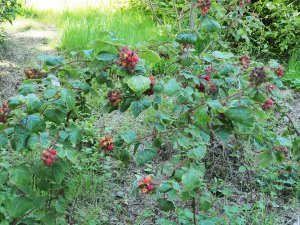
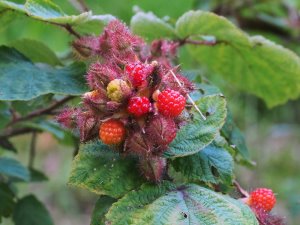
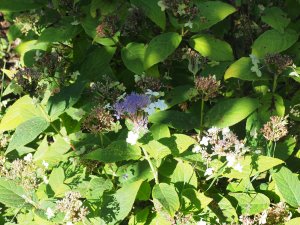
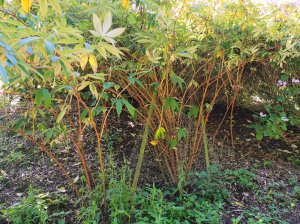
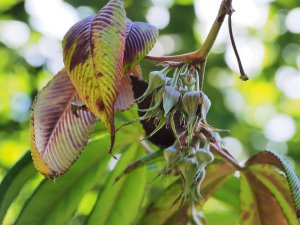
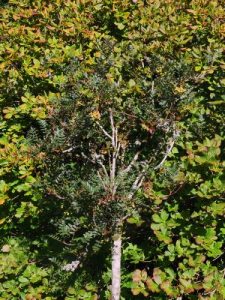
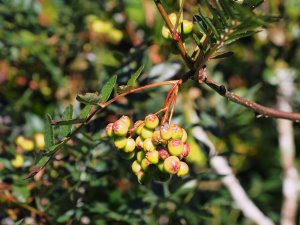
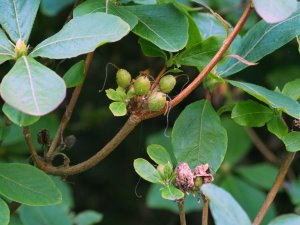
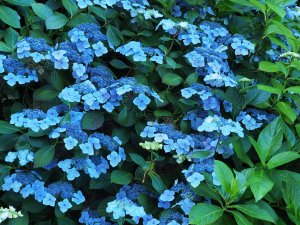
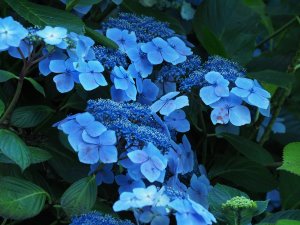
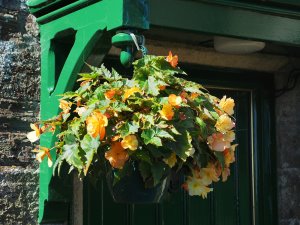
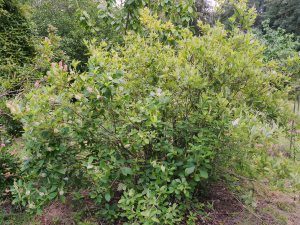
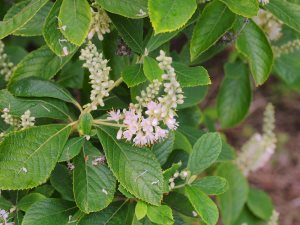
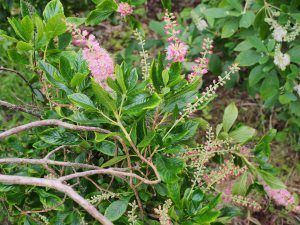
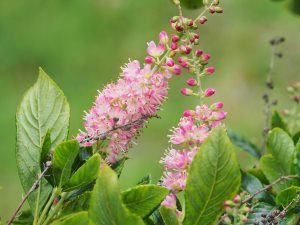
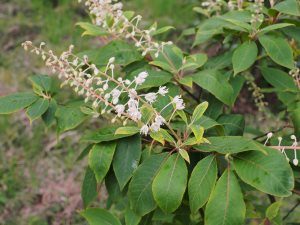
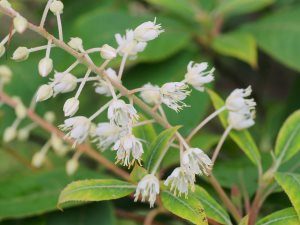
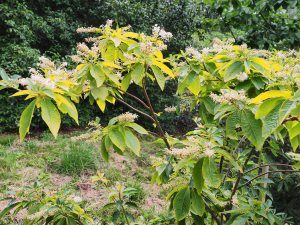
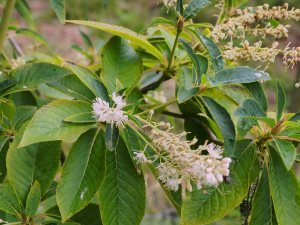
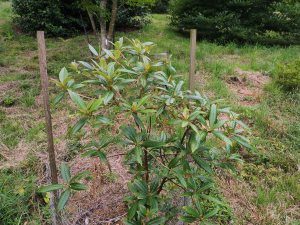
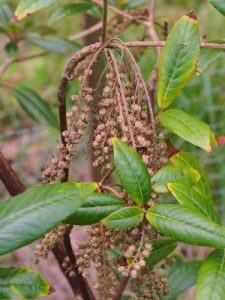
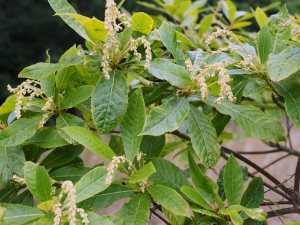
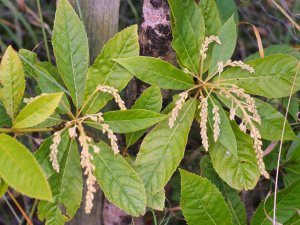
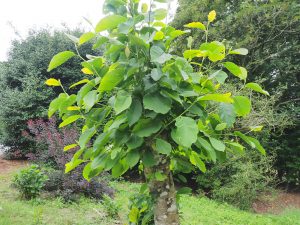
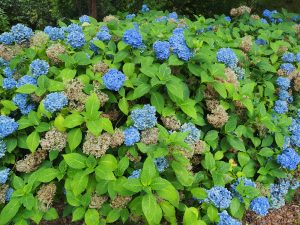
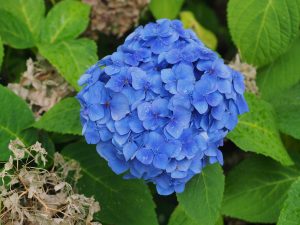
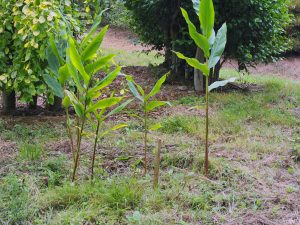
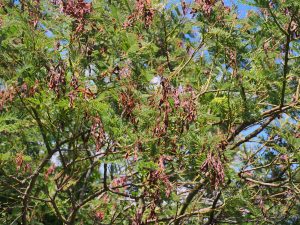
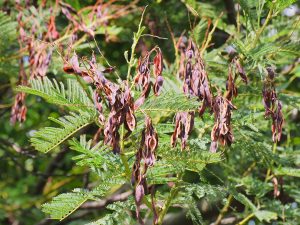
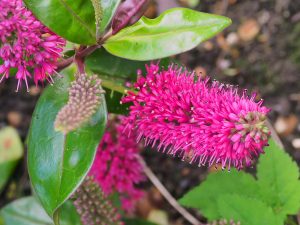
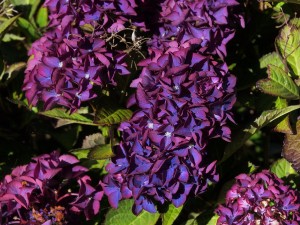
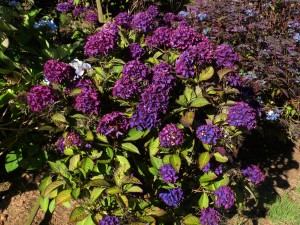
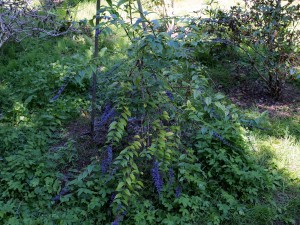
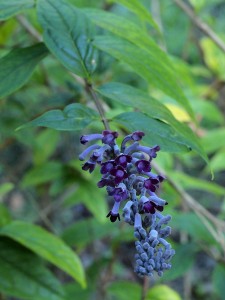
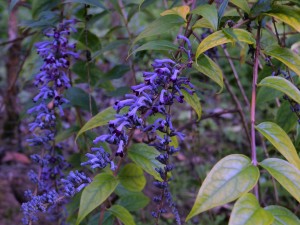
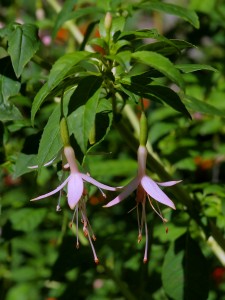
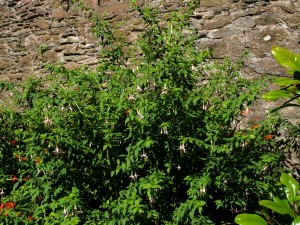
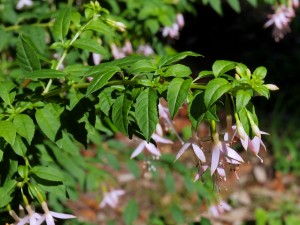
’18. 08. 09 The Mexican tree dahlia shows typical problems with too cool growing conditions. The stems don’t ripe well and die off, next years growth is late and too weak. This dahlias ( imperialis, tenuicaulis which are very similar) flower only under long-night conditions, so flowering starts regularly in November. Here they grow much better, now two meters tall, and survive winters better, too, but flowering is too late. Other dahlias are more rewarding, esp. the daylength insensitive newer cultivars. They start flowering already in June when spring was warm.
’19 Flowering of Salvia confertiflora is very early, as this is also a daylength- sensitive plant. Here it flowers also late, in October–November, together with Salvia leucantha, elegans and mexicana.
’20 Eucryphia lucida is a true species (so without x), sister to E. milliganii, from Tasmania.